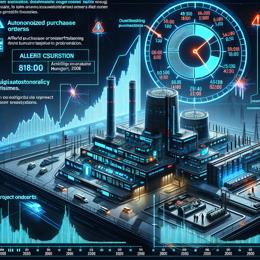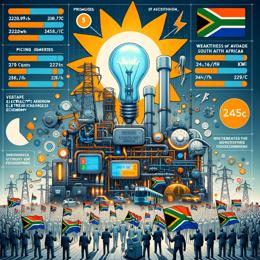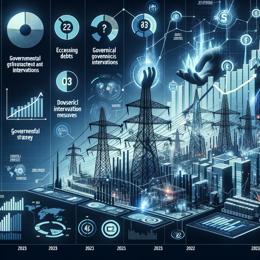Image created by AI
Disparity in Eskom's Electricity Usage Figures Raises Tariff Policy Concerns
Recent scrutiny of electricity usage data in South Africa reveals a stark discrepancy between the actual consumption of South African households and the figures presented by Eskom, the national power utility. Authoritative data suggests that the average household’s daily electricity consumption is significantly lower than Eskom's long-held claim of 30 kilowatt-hours (kWh).
Analyzing information from multiple credible sources, it has come to light that the per capita electricity usage in South Africa amounts to approximately 3,218kWh annually or about 8.8kWh per day, according to the US Energy Information Administration’s (EIA) analysis in 2021. Given the average household size of 3.4 individuals, this per capita figure would theoretically translate to around 29.92kWh per day. However, this per household calculation proves infeasible as the EIA's figure encompasses Eskom's total electricity sales, which also include commercial and industrial consumption. Factually, residential customers accounted for only about 19% to 22% of Eskom's total electricity consumption for that year.
Detailed data from the year 2021 has revealed that the actual daily consumption per household lies between 5.68kWh and 6.58kWh, a fraction of Eskom's estimate. Estimates from alternative sources like solar power and energy companies also dispute Eskom’s figures, citing varied daily household consumption from 7kWh to 15kWh, all notably lower than Eskom's 30kWh.
Comparisons with the UK's energy regulator Ofgem show that an average UK household consumes roughly 8kWh per day. Local evaluations using recent Eskom consumption data and population estimates calculated a new average, showing that, as of October 2024, the daily consumption for the average South African household would be around 6kWh or 7kWh.
The implications of Eskom's inflated figure are consequential as it informs retail tariff policies. Eskom's proposed tariff reforms, intended to reflect cost more accurately, suggest an increase in fixed tariffs coupled with lower variable charges. This promises to bring down bills for high-consumption users while dramatically increasing them for households consuming less, a move which appears inequitable given the true average consumption statistics. In light of proposed tariff adjustments, households consuming around 185kWh to 214kWh per month could see their bills increase by up to 82%.
Eskom’s assertion that the changes would reduce the average bill for its direct residential customers remains questionable in view of the actual consumption data. Despite requests for further insights into Eskom’s household average and median electricity consumption data, the utility has not provided clarity, leaving stakeholders to challenge the proposed tariff restructure's fairness, especially for lower-income and middle-class households.
At present, Eskom has hinted at maintaining its stance on higher fixed costs and lower energy charges in its upcoming retail tariff plan for 2024/25. The power utility's lack of transparency and its reliance on outdated or generalized average consumption data points to a need for accurate measurements to inform fair and equitable electricity tariffs for South African households.










